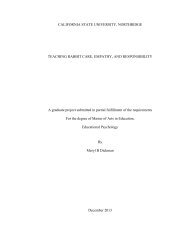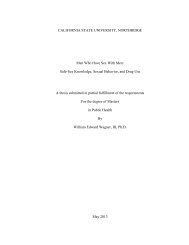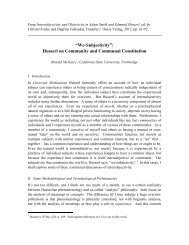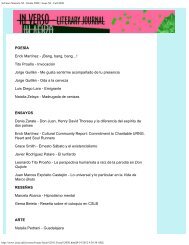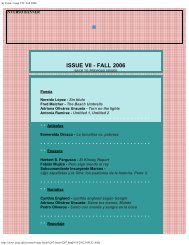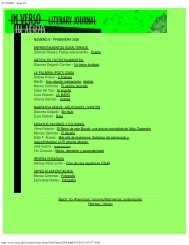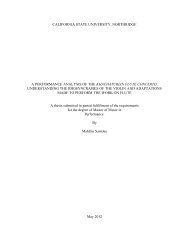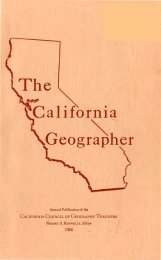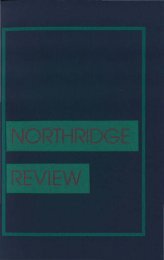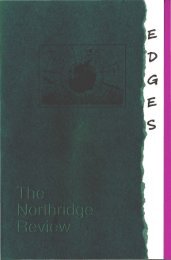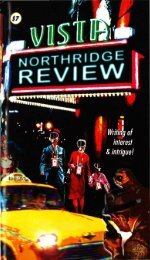2644 - CSUN ScholarWorks - California State University, Northridge
2644 - CSUN ScholarWorks - California State University, Northridge
2644 - CSUN ScholarWorks - California State University, Northridge
Create successful ePaper yourself
Turn your PDF publications into a flip-book with our unique Google optimized e-Paper software.
2842<br />
journal of Student Research Abstracts · 87<br />
A GOLDFISH'S USE OF ITS OLFACTORY SENSES TO FIND FOOD.<br />
Rachel Monterrubio and Steve DeGusta (teacher). John F. Kennedy High School, 6715 Gloria Drive<br />
Sacramento, CA 95831. '<br />
To test weather a goldfish can use it's olfactory senses to find food I created a maze to run the fish through<br />
so as to take away the option of using it's vision. For the first half of my experiment I used a sample group A<br />
of five goldfish. I placed three pellets of fish food at the end of one hall of the maze and placed one goldfish<br />
from group A in to the starting room of the maze. I gave each fish one chance to find the food under five minutes<br />
where I would then change the placement of the food to a different hall of the maze and time them again.<br />
Each fish had a total of four runs. For the second part of my experiment I attempted to manipulate the olfactory<br />
senses of the goldfish so as to imprint upon the fish the pathway to the food which remained in one stationary<br />
position. I did this by leading each of the five fish of group B to the food, four individual times, by<br />
using the negative presence of a spoon to discourage the goldfish from going in the wrong direction. I then<br />
allowed each fish one trial to find the food under five minutes. Finally I removed the food and allowed each<br />
fish one trial of five minutes to reach the spot where the food had previously been placed. For the first part of<br />
my experiment the results of the goldfish finding its food under five minutes were below average, as where the<br />
results of the imprinting trials, suggesting that a goldfish does not use its olfactory senses to find it's food.<br />
2843<br />
HOW HERMIT CRABS LIVE AND INTERACT IN THEIR ENVIRONMENT WHEN<br />
IT IS TIME TO MOVE TO A NEW SHELL.<br />
N.C. Flores, B. Harrington, C. Ronglie, and Engelmann (teacher). Palisades Charter High School, 15777<br />
Bowdoin St., Pacific Palisades, CA 90272.<br />
From a series of selected shells from different species of snails, which shell is preferred by the hermit crab?<br />
Different types of snail shells were placed in front of unshelled crabs. Two larger crabs and two smaller ones.<br />
Three out of the four chose the hard dark extremely bumpy shells. The last one, the smallest one, chose a<br />
smooth light colored one.<br />
2845<br />
THE EFFECTS OF CAFFEINE ON THE LEARNING AND ABILITES OF MICE.<br />
Steven Fong and Steve DeGusta, (teacher). John F. Kennedy High School, 6715 Gloria Drive, Sacramento,<br />
CA 95831.<br />
At the biochemical level, learning still is not completely understood, but it is generally believed that chemcials<br />
known as neurotransmitters play an intergal part in our ability to learn. Caffeine is known for its ability<br />
to block the action of a chemical known as phosphodiesterase (PDE). This chemical causes the breakdown of<br />
secondary neurotransmitters in the body. Because the secondary neurotransmitters are not broken down, the<br />
effects of the primary neurotransmitters are greatly amplified, which can cause an increase in physical abilities,<br />
alertness, and possibily the an increase in the learning abilities of female mice. The experimental was subjected<br />
to 0.15 mg of caffeine (the equivalent of a human drinking 2.5 cups of coffee) 2 hours prior to being run<br />
through a maze 4 times. It was found that caffeine does play a significant role in mouse learning, and differences<br />
between the control and experimental groups was significant (p < 0.02).



